New CMO Henderson won't skirt health care safety
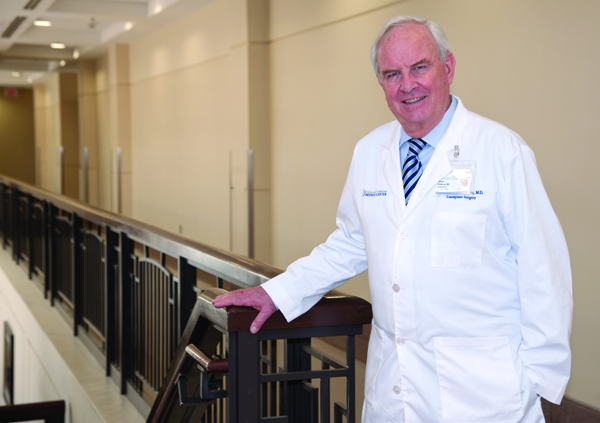
The Medical Center's new chief medical officer wears a Scottish kilt.
But what Dr. Michael Henderson, a native of Edinburgh, is better known for is his international reputation in health-care quality improvement. "It's about everyone coming to work and knowing you are a caregiver - everyone, not just physicians," said Henderson, who joined the UMMC team March 1.
"When someone says, 'I clean the rooms here, and I'm helping to prevent infection,' that's where you want your culture."
Henderson, since 2010, has served as chief quality officer of the Cleveland Clinic Health System in Cleveland, Ohio. He's wasted no time since his arrival at UMMC in setting into motion a mindset for quality safety outcomes built on his three personal pillars: leadership, culture and performance improvement.
And to achieve patient outcomes in which they suffer no harm - called hospital-acquired conditions, or HACs - during their hospital stay, Henderson said he will promote teamwork and collaboration among employees.
"I have a big opportunity here to be a leader in quality outcomes, and to help others get better," he said.
Henderson's broad experiences in clinical, academic and administrative medicine give him the tools to take on that job.
He earned a Bachelor of Medicine and Bachelor of Surgery degree from the University of St. Andrew's School of Medicine in 1969 and became a Fellow of the Royal College of Surgeons of Edinburgh in 1974. Henderson also is a fellow of the American College of Surgeons and chairs its advisory committee on national surgical quality improvement.
He holds a higher surgical training certificate in general surgery from the combined Royal Colleges of Surgeons in Great Britain. He has been in the United States since 1978, with a successful surgical career at Emory University's School of Medicine and then the Cleveland Clinic.
Beginning in 2006, Henderson served as chairman of the Quality and Patient Safety Institute in the Cleveland Clinic Foundation. Since 2003, he also was a professor of surgery in the Cleveland Clinic Lerner College of Medicine of Case Western Reserve University.
He served as a global expert for the development of the World Health Organization's Leaders Guide on Patient Safety and Quality of Care in Service Delivery. He is on the advisory board for Robust Performance Improvement for the Joint Commission Center for Transforming Healthcare.
"Dr. Henderson has had a distinguished clinical career as a nationally recognized hepatobiliary and transplant surgeon," said Dr. Charles O'Mara, associate vice chancellor for clinical affairs. "In addition, as chair of the Quality and Patient Safety Institute at Cleveland Clinic, as well as their chief quality officer, he has developed an international reputation for improving medical safety and quality of care."
Henderson said he didn't set out to spend the majority of his career in the United States. Growing up in Dundee, Scotland, he said he "never left the 100-mile radius" between that city and Edinburgh. But he was drawn to St. Andrew's, founded in the early 1400s, where his father was dean of the medical school. "Just growing up in that history… that was huge," said Henderson, whose mother also was a physician.
Henderson trained for a decade in Edinburgh, then as a fellow at the Royal College of Surgeons. "Really early on, I decided I wanted to be a surgeon," he said. He was offered three fellowships after that, and chose to go to Emory in Atlanta.

Dr. Michael Henderson, right, and his sons were among family members wearing kilts at the marriage of John Paul Henderson, center. Also pictured is Justin Henderson. Michael Henderson is a native of Edinburgh, Scotland.
"The chairman of surgery there had developed a new operation for controlling bleeding for patients with cirrhosis," he said. "I'd spent time before with a surgeon who also dealt with that problem. My interest was stimulated."
The next year, he explored job options in Edinburgh, but Atlanta called. "I went back to Emory, and the rest is history," Henderson said. During 14 years there, "I got a lot of chances to do clinical studies, and about halfway through, liver transplants were really taking off. I started a liver transplant program in the 1980s."
It was at Emory that Henderson performed his first liver transplant. Several years later, he visited the Cleveland Clinic. "I was hooked from day one," he said. "I went in as chair of general surgery and agreed to put together a transplant center to oversee all clinical transplant programs. It stimulated me to get involved in the transplant field nationally."
The Ohio Transplant Consortium drew accolades from the newly developing United Network for Organ Sharing, or UNOS, and was in the forefront of the nation's first efforts to create a database for organ donation and guidelines for organ allocation to patients.
Under Henderson's leadership as chairman of surgery, the number of surgeons tripled from six to about 18. His duties expanded to include quality safety outcomes, a field he will continue to pursue at UMMC.
He was attracted to UMMC, Henderson said, because he saw great opportunity to improve performance hospital-wide and put his personal pillars to work. The Medical Center's leadership is strong, he said. "I have no question about that. That's why I came here."
Needed improvements include the hospital's culture and the perception that care is resident-driven, Henderson said. "It's getting everyone engaged and valuing their roles. The fear of doing something wrong is a culture that needs to change. What Dr. (Phyllis) Bishop is doing with error prevention is part of that, and it's even broader.
"There are a lot of quick fixes, but there are ways of making performance improvement stick so you're still not fixing things six months later."
As Henderson transitions from Ohio to Mississippi, he makes time to visit his four children and seven grandchildren, most living in North Carolina.
He tries to maintain his heritage, although "my youngest son is the only one who plays the bagpipes," he said. Henderson wears a kilt to important events, such as the wedding of one of his sons about two years ago. "The grandkids all turned up in kilts," he said.
NEW PSYCH CHAIR RODGERS SPEAKS VOLUMES
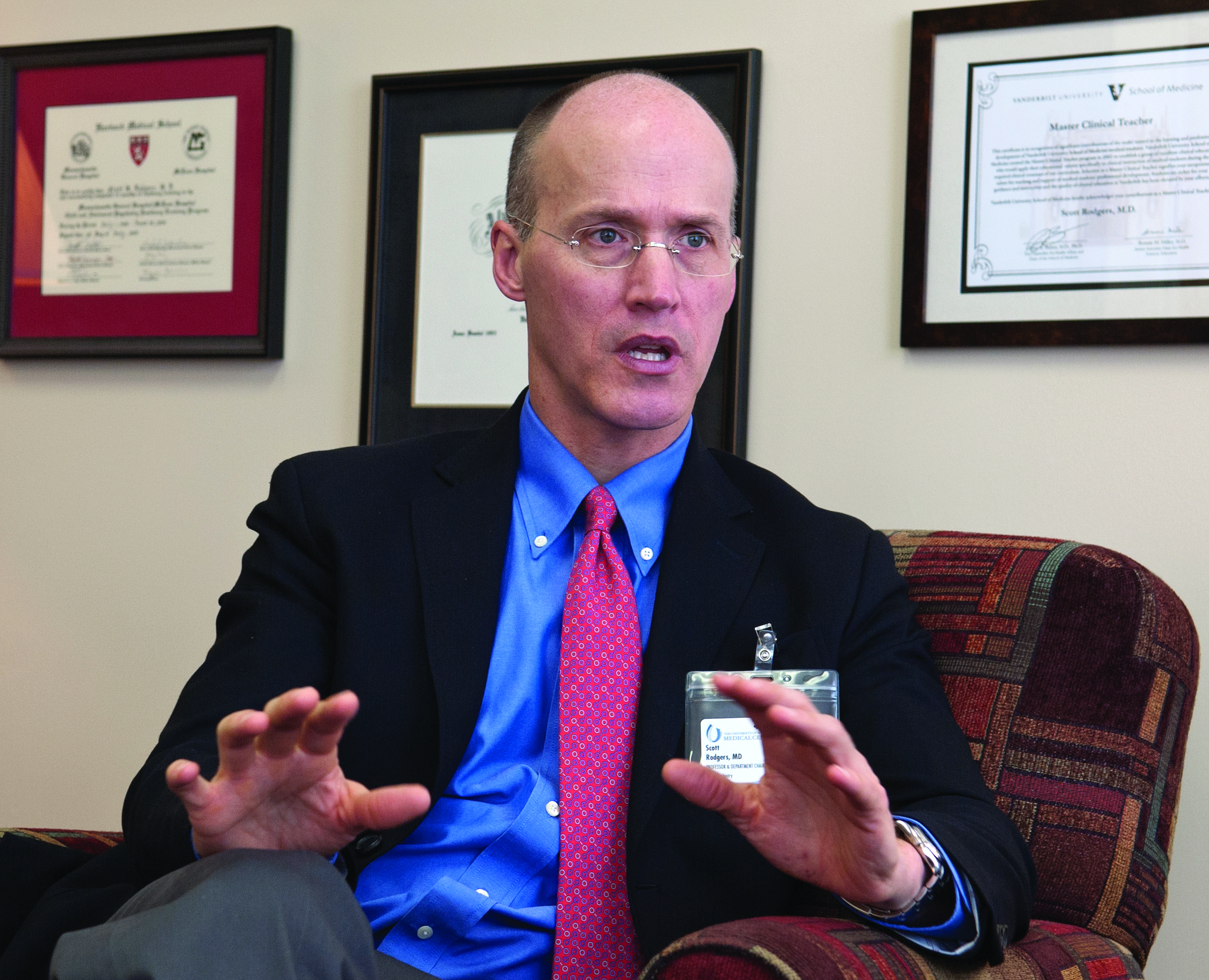
In addition to English, Dr. Scott Rodgers knows German and French and is also intrigued by Spanish.
Chances are, he speaks your language - but, he is most fluent in the language of the mind.
Rodgers joined UMMC on Dec. 1 as the new chair of the Department of Psychiatry and Human Behavior, taking over for Dr. Grayson S. Norquist.
It's Rodgers' "Traumberuf," his "métier de reve." His "dream job."
"It gets me back to my roots in psychiatry," said Rodgers, whose main clinical interest is child and adolescent psychiatry. "It's a return to my specialty."
A Decatur, Ga., native, Rodgers arrived at the Medical Center from Vanderbilt University, where he served for more than seven years as the associate dean for Medical Student Affairs.
He had been filling other roles there as well: associate professor of education and medical administration, and associate professor of psychiatry. He was there for about 15 years.
"I thought I would never leave there," he said, "because I loved it so much."
His road to Nashville began at Duke University, where in 1988 he earned degrees in zoology and German literature.
"I love foreign languages," said Rodgers, who taught himself French. "I also love to travel, and there's no better way to learn about a culture than through its language."
After Duke, the culture of home called him back to Georgia, where he worked for two years as a sixth-grade science teacher and swim coach at a private prep school in Atlanta. His simmering plans for medical school came to a boil when he won a scholarship to Vanderbilt - his future as a pediatrician assured. Or so he thought.
"I shifted to psychiatry, what I saw as the most interesting specialty of all - sitting down and talking with people about what motivates them," he said. "It is an underappreciated profession, but it can be enormously helpful to people, which I had not realized before medical school.
"I became passionate about it; I decided to choose what I love."
That love translated into post-medical school training that included an internship at Massachusetts General Hospital, Harvard Medical School, where he also did his residency in psychiatry, as well as a fellowship in child and adolescent psychiatry.
His first job, post-Harvard, was back at his alma mater. There, during the past 10 years, he oversaw a Student Wellness Program that sought to maintain the physical and mental health of highly-stressed medical students, providing them with classes in yoga and healthy cooking, forums on nutrition and sleep, a mentoring program and more.
"From that, I realized that I love leading, building programs, raising morale. Now, the opportunity to be chair of a department is just a continuation of that," he said.
As the chair, he is setting a host of goals, not least of which is this: "To see more medical students choose psychiatry and stay here and work in the state. We need to eliminate health disparities in Mississippi, and that includes disparities in the treatment of mental illness."
Rodgers will help treat some of those illnesses himself, particularly those affecting children. "I will be able to see patients," he said.
As an administrator, he oversees about two dozen faculty members, leading them from an office furnished with shelves holding items that suggest his priority as a clinician: toys, teddy bears and other stuffed animals.
"There probably aren't too many chairs who have all that," he said.
SOM ENLISTS EDUCATION RESEARCH EXPERT BORGES
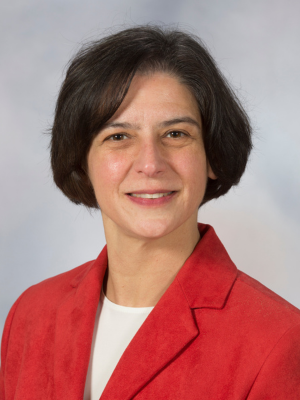
State University Boonshoft School of Medicine, has joined the Medical Center faculty as professor of pediatrics and assistant dean for medical education research and scholarship.
Borges will provide a supportive environment to build a community of educational scholars by mentoring faculty and providing informal and formal instruction to faculty on the scholarship of teaching and learning; assisting faculty in the design of viable educational research and scholarly projects, including both quantitative and qualitative, and completion of projects for presentation and publication; and developing collaborative relationships with UMMC schools and departments to foster educational research and scholarship.
After receiving the B.A. in psychology from Boston University in 1988, Borges earned the M.A. in agency counseling in 1993 and the Ph.D. in counseling psychology in 1998 at Indiana State University. She did an internship in clinical psychology from 1997-98 at Veteran's Administration Hospital, Danville, Illinois, and a fellowship in clinical health psychology from 1998-99 in the Department of Internal Medicine at the Virginia Commonwealth University School of Medicine.
Prior to her service at Wright State, she was on the faculty at Northeastern Ohio Universities College of Medicine, Rootstown, and the University of Akron, Ohio.
Borges serves on the AAMC Careers in Medicine Advisory Board and the Association for the Behavioral Sciences and Medical Education executive board and was chair-elect of the Medical Education Scholarship, Research and Evaluation AAMC Central Group on Educational Affairs. She also is past president of the Society of Directors of Research in Medical Education and past chair of the Health Psychology Section, Division 17, American Psychological Association.
Borges has authored or coauthored more than 70 articles in peer-reviewed professional publications and three book chapters. Her primary research interests include personality and medical specialty choice, physician career development and non-cognitive factors contributing to student success.
DIABETES SPECIALIST LILLIAN LIEN SIGNS ON AS DIVISION CHIEF
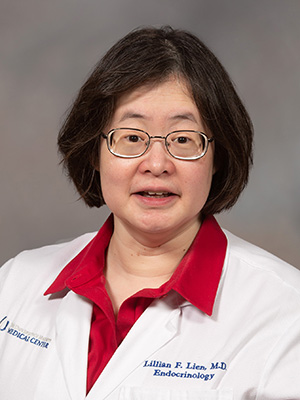
Dr. Lillian F. Lien, diabetes specialist and associate professor of medicine at Duke University Medical Center, has joined the Medical Center faculty as a professor of medicine and division chief for endocrinology, metabolism and diabetes.
Knowing the extent of obesity and diabetes in the state of Mississippi, she is eager to collaborate with Medical Center faculty on the care of these patients and on improving overall health in this state.
After receiving the B.S. in biomedical engineering from Harvard University in 1994, Lien earned the M.D. at the Duke University School of Medicine in 1999. She had an internship in internal medicine from 1999-2000, a residency in internal medicine from 2000-02, and a fellowship in endocrinology, metabolism and nutrition from 2002-05 at Duke University Medical Center.
She joined the Duke University Medical Center faculty in 2005 as an associate in medicine and became an assistant professor of medicine in 2006, medical director of Duke Inpatient Diabetes Management in 2008 and an associate professor of medicine in 2013.
Throughout her career, Lien has had a passion for the management of chronic diseases and is especially devoted to safe care for all individuals with diabetes mellitus. On these topics, she is the author or coauthor of 40 articles in peer-reviewed professional publications and serves as a journal reviewer for several scientific journals.
She is an active member of numerous professional organizations, including the American Diabetes Association, the American College of Physicians and the American Association of Clinical Endocrinologists. A nationally-sought invited speaker, Lien's research interests include inpatient diabetes, intravenous insulin and the metabolic syndrome.
ANESTHESIOLOGY STAFF ADDS PAIN MANAGEMENT EXPERT PROFESSOR INES BERGER
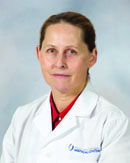
Dr. Ines H. Berger
Dr. Ines H. Berger, an experienced anesthesiology/pain management physician and assistant dean for Medical Education Research and Scholarship, has joined the Medical Center faculty as a professor of anesthesiology.
After earning the M.D. in 1986 and the Ph.D. in medical sciences in 1988 at the Friedrich-Alexander University, Erlangen, Germany, Berger did a research fellowship in experimental surgery there from 1987-89.
She did an internship in surgery from 1989-90, a residency in anesthesiology from 1990-93, a fellowship in critical care medicine from 1993-94 and a fellowship in pain management in 1997 at the Mayo Graduate School of Medicine, Rochester, Minn.
She also had clinical anesthesiology training from 1994-95 at Ruprechts-Karl University, Heidelberg, Germany. She completed an M.B.A. in management at Viterbo University, LaCrosse, Wis., in 2009.
Berger was on the SUNY, Buffalo, N.Y., faculty as an assistant professor of anesthesiology from 1995-96 and concurrently served as a staff anesthesiologist at Veterans Affairs Medical Center, Buffalo.
She has been an instructor, assistant professor and consultant in anesthesiology at the Mayo Medical School from 1998-2003; an associate professor of anesthesiology and perioperative medicine, medical director of pain medicine and pain fellowship director at Medical College of Georgia/Georgia Regents Univeristy, Augusta, Ga., from 2004-06; attending pain medicine, neuroscience service line director at the Neuroscience Center, Gundersen Lutheran, LaCrosse, Wis., from 2006-10; and professor of anesthesiology and perioperative medicine, medical director of pain medicine and pain fellowship director at MCG/GRU from 2010-14. She is a lieutenant colonel in the Army Reserve Medical Corps.
An active member of the American Society of Regional Anesthesia and Pain Medicine, the American Society of Addiction Medicine and the American Society of Anesthesiologists, Berger is author or coauthor of 13 articles in peer-reviewed professional publications, two case reports, six book chapters and 22 abstracts.
PSYCH FACULTY WELCOME ETHICS SPECIALIST HOPKINS
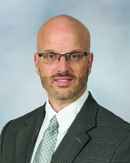
Dr. Patrick D. Hopkins
Dr. Patrick D. Hopkins, a Millsaps College professor and affiliate faculty of the Center for Bioethics and Medical Humanities, has joined the Medical Center faculty as a professor of psychiatry.
After receiving the B.A. in philosophy and psychology from
the University of Mississippi in 1988, Hopkins worked as a research technician in a neuroanatomy laboratory, then went on to earn the M.A. in philosophy in 1993 and the Ph.D. in philosophy in 1996 at Washington University.
A postdoctoral research fellow at Bowling Green State University from 1996-97, he had special training in a clinical ethics rotation from 1997-98 at the University of Colorado Health Sciences Center.
A visiting assistant professor at the University of Colorado-Boulder from 1997-98, Hopkins served as an assistant professor at Ripon College from 1998-2000 before joining the Millsaps faculty in 2000 as an assistant professor. He became an associate professor there in 2004 and a professor in 2010.
Since 2005, Hopkins has served on the Institutional Review Board at UMMC and in 2014 was accepted to and attended a competitive neuroscience boot camp at the University of Pennsylvania Center for Neuroscience and Society.
The author or coauthor of 26 major articles in peer-reviewed professional publications and the editor of three anthology textbooks, Hopkins has given more than 40 presentations nationwide. Former president of the Mississippi Philosophical Association, he specializes in such fields as ethics, biomedical ethics, moral psychology and neuroscience, theoretical psychopathology and philosophy of technology.
BALL, CLINICAL PRACTICE VETERAN, JOINS OB-GYN TEAM

Dr. D. Kyle Ball
Dr. D. Kyle Ball, a veteran obstetrics and gynecology physician with 27 years of clinical practice in Jackson, has joined the Medical Center faculty as an assistant professor of obstetrics and gynecology.
After receiving the B.S. in biology magna cum laude from Mississippi State University in 1980, Ball earned the M.D. at UMMC in 1984. He had postgraduate training in the Department of Obstetrics and Gynecology at Tulane University Affiliated Hospitals, New Orleans, from 1984-88.
Ball served as an OB-GYN physician at the Clinic for Women of Central Mississippi in Jackson from 1988-2014.
A fellow and diplomate of the American College of Obstetricians and Gynecologists and a member of the Mississippi State Medical Association, he is past president of the Tulane OB-GYN Society, the Southeastern OB-GYN Society and the Jackson Gynecic Society.
He also has served on the Board of Trustees of Central Mississippi Medical Center and is an OB-GYN medical malpractice expert.
FORMER FACULTY MEMBER JOHN ISAACS REUNITES WITH OB-GYN COLLEAGUES

Dr. John D. Isaacs Jr.
Dr. John D. Isaacs Jr., a School of Medicine alum, former faculty member and long time private-practice specialist in infertility, has joined
the Medical Center faculty as an associate professor of obstetrics and gynecology.
After receiving the B.A. in biological science from the University of Mississippi in 1984, Isaacs earned the M.D. at UMMC in 1989. He had an OB-GYN internship and residency here from 1989-93 and completed a reproductive endocrinology fellowship in the Department of Obstetrics and Gynecology at Washington University Medical Center, St. Louis, Mo., in 1995.
Isaacs served as an assistant professor of OB-GYN in the Division of Reproductive Endocrinology at UMMC from 1995-99 before leaving for private practice.
An ad hoc reviewer for the journals Fertility and Sterility and the Journal of the Mississippi State Medical Association and a special reviewer for Obstetrics and Gynecology, Isaacs is a fellow of the American College of Obstetricians and Gynecologists and is an active member of several professional organizations.
He has authored or coauthored 18 articles in peer-reviewed professional publications, seven book chapters and 16 abstracts and has made numerous presentations at scientific meetings throughout the U.S. and Canada.


